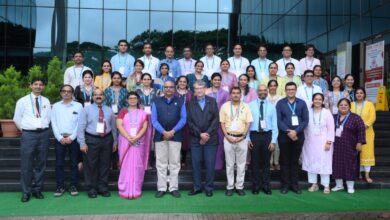MSc Financial Technology launched by Essex Business School of University of Essex to develop graduates ready to meet the ‘FinTech’ challenge

The launch of the digital rupee in India shows how fast technology is transforming our financial system – creating new services, products and even currencies.
In response to the new opportunities emerging in the finance sector thanks to the latest technology, Essex Business School at the University of Essex is launching a new MSc in Financial Technology (FinTech).
The master course established by leading FinTech expert Professor Franco Fiordelisi offers three routes – finance, economics and computer science – depending on the focus and career aspirations of the student.
Professor Franco Fiordelisi, Professor of Banking and Finance, University of Essex, said: “I realised that traditional Masters in finance are not able to train students for the new challenges that technology is giving to the financial system. Fintech cannot be addressed from a single perspective, such as the economic, financial, engineering, and physical ones. Fintech requires a specific program merging these different perspectives. Fintech needs a specific program to be well-addressed.
“Our programme combines the skills from the Department of Economics, Essex Business School and the School of Computer Science and Electronic Engineering.
Professor Fiordelisi is President of the Financial Intermediation Network of European Studies (FINEST) and has researched and consulted on behalf of the European Central Bank, World Bank, and the Federal Reserve of New York.
This gives him an insight into the skills and knowledge needed by FinTech graduates. “Our students will have a wide perspective of the Fintech world and will also be trained in programming and coding in Python,” said Professor Fiordelisi.
“Our programme is also flexible, so the student can choose modules on their interest to go deep into the area they will be most interested in, including investments, asset management, banking, risk management and monetary policy.”
According to Professor Fiordelisi, the pace and impact of technology are increasing in the financial sector.
“Fintech is the new paradigm in finance,” he said. “Technology has initially affected how financial services are delivered, but now it has created new financial products, new currencies, a new form of financial exchanges and, finally, new financial players.
“Traditional financial players have to compete with these new players that, although smaller in the size of financial transactions compared to the traditional financial system, are vastly growing and are a serious threat to traditional players.
“Even regulators have to face the challenges driven by technological advances, leading to a new form of regulation/supervision and, likely, to a new form of traditional currency (such as the digital euro and the Indian digital rupee).
“Technology is also impacting how traditional financial intermediaries work: machine learning, artificial intelligence, deep learning, big data, and blockchain are new tools that financial companies are deeply using for transactional data analysis and improvising their risk management and compliance activities.”
Essex Business School has an international reputation for finance research and academic work alongside the financial industry, regulators, and policymakers both in the UK (for example, at the Royal Bank of Scotland and the Bank of England) and internationally (such as the European Central Bank, the Federal Reserve, and the Bank for International Settlements).
Teaching is grounded in contemporary issues and professional practice, supported by industry-standard facilities like the Bloomberg virtual trading floor.
The University of Essex is ranked in the Top 200 for Business and Economics in THE World University Rankings by Subject 2022 and in the top 200 for Accounting and Finance in the QS World University Rankings by Subject 2022.
About University of Essex
Founded in 1964, University of Essex is one of the UK’s leading universities, which has grown from 122 students in the first year to 18,000+ now. The University maintains three campuses at Colchester, Southend and Loughton. Essex has three faculties which lead on delivering excellence in teaching and research: the Faculty of Arts and Humanities, Faculty of Science and Health, and Faculty of Social Sciences. It has close to 1,000 active researchers and 18,000 students from over 140 countries with an alumni strength in excess of 100,000. According to The Complete University Guide 2023, University of Essex is Top 40 in UK universities and 25th for international outlook in the Times Higher Education World University Rankings 2022




